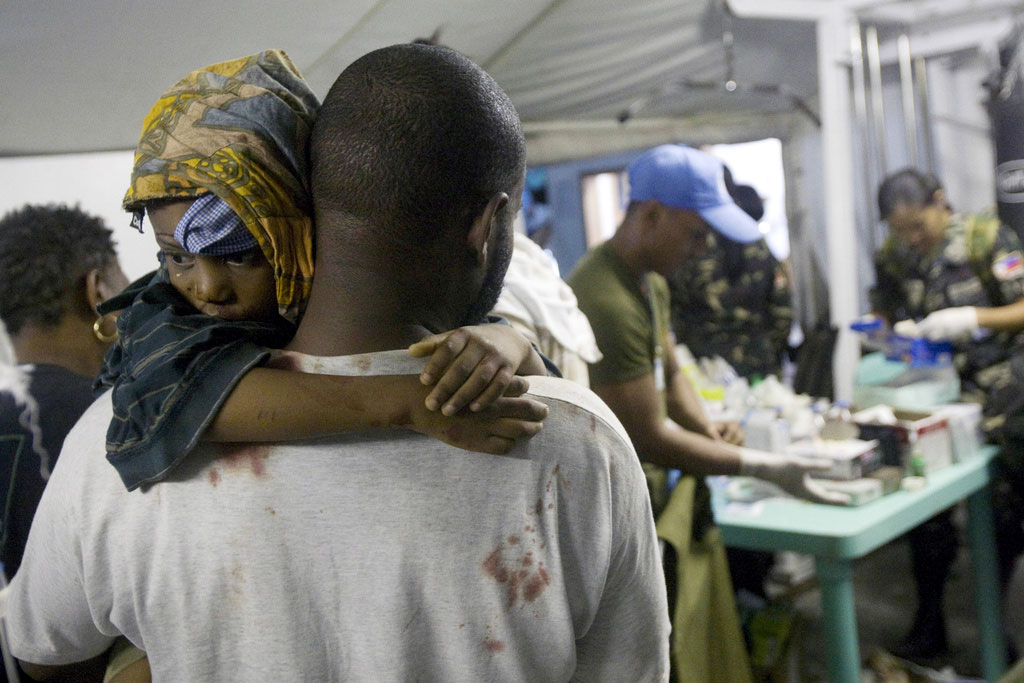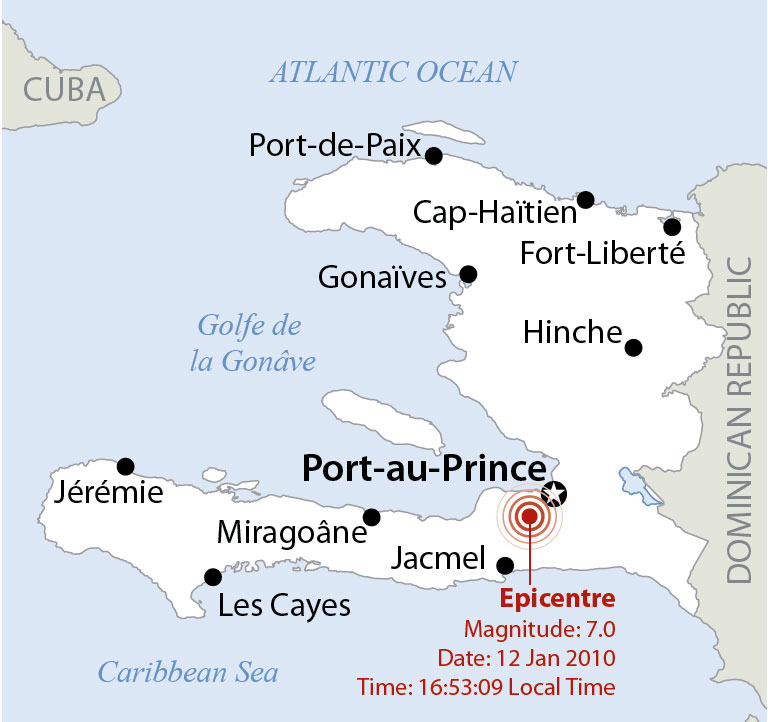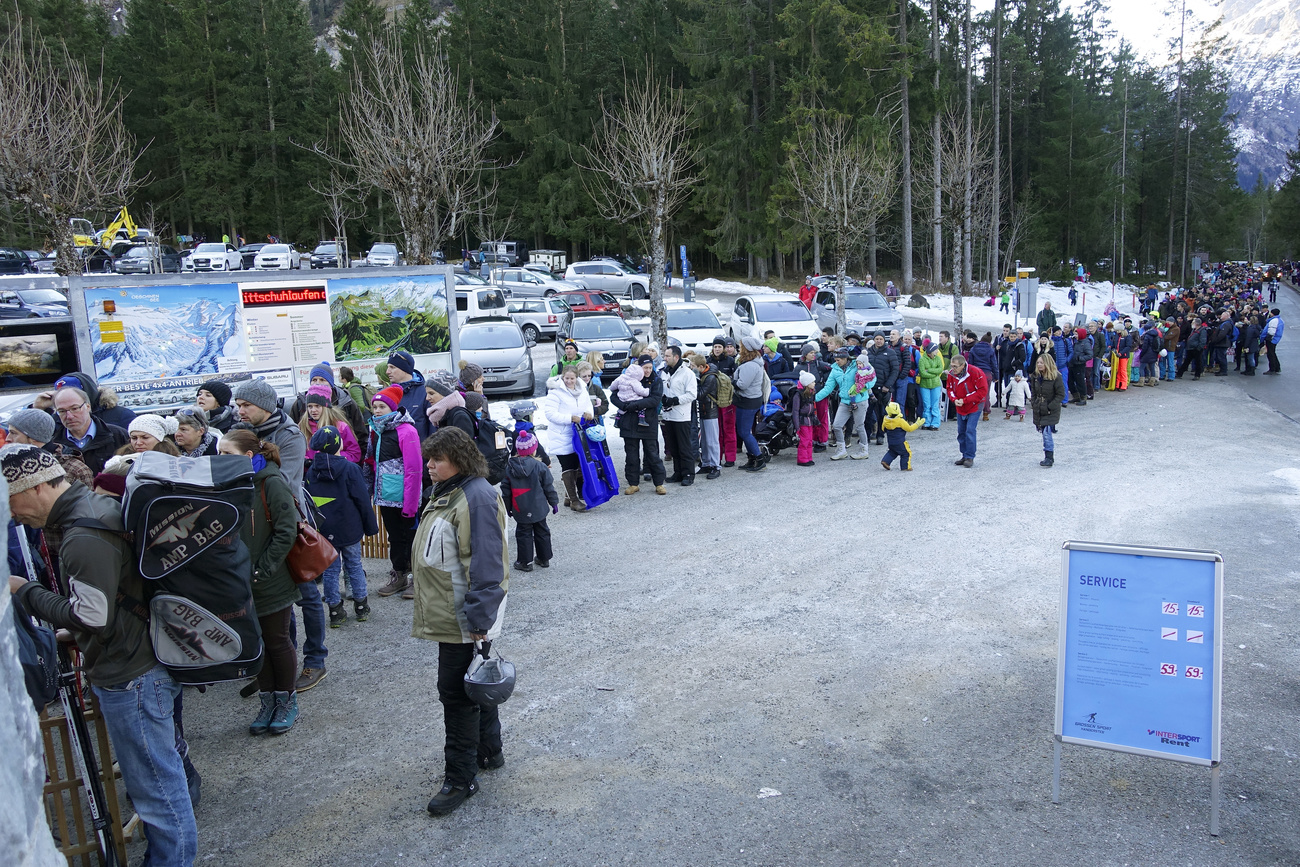Diaspora wants a say in Haiti’s future

Still reeling under the shock of Tuesday’s earthquake, and often without news of their families Haitians in Switzerland are already looking to the future.
Many of them will be gathering in Lausanne on Saturday, to exchange news and consider the best ways to organise aid now. They will also be discussing what needs to happen in the long term, how Haitians abroad can become more involved in the country’s affairs.
Jean-Wilfrid Fils-Aimé, secretary general of the Swiss Haitian Club, thinks it makes sense in the short term to support Swiss Solidarity, the Swiss disaster aid organisation, rather than for Haitians in Switzerland to try to launch their own initiatives which would be difficult to see through.
But once aid experts have tackled the immediate emergency, Haitians abroad have an important role to play, says Fils-Aimé.
“We can’t let the country simply drift. The diaspora must bring its weight to bear on the direction that reconstruction follows. That’s my dearest wish,” Fils-Aimé told swissinfo.ch.
He intends to step up his contacts with the United States and Canada, the home of most of the two million expatriate Haitians, to work out joint projects with them.
Haitians living abroad, most of them from the country’s middle class, already make a decisive contribution to the economy of Haiti, where 80 per cent of the population live on less than two dollars a day.
According to the United Nations Development Programme, they remitted $1.8 billion (SFr1.83 billion) to the country in 2008 – twice as much as the international aid it receives.
Helping the community
“Increased involvement of the diaspora, whose members help not only their own families back home, but also the whole of the community to which they belong, is already a topic of discussion in Haiti,” said sociologist Charles Ridoré. One of the leading figures in the roughly 1,000-strong Haitian community in Switzerland, Ridoré is a former head of the Swiss Catholic Lenten Fund charity for French-speaking Switzerland.
“Last October I attended a roundtable discussion in Port-au-Prince on relations between the diaspora and the mother country. We were able to set out the role of these relations and describe the obstacles that can arise,” Ridoré told swissinfo.ch.
“Edwin Paraison, who has since become minister in of the diaspora, warmly welcomed the idea of Haitians abroad getting more involved.” But this may not be entirely straightforward.
“The diaspora sees itself as something of a milk cow, whose only role is to come up with money. But any greater involvement is also seen in Haiti as unwelcome competition for some of the inhabitants. The dialogue we have started ought to enable us to get over these problems, and the earthquake should help this process.”
Ridoré explains that the outgoing parliament has already lifted one obstacle to diaspora involvement, by passing a resolution allowing Haitians to hold dual nationality.
This means that those who have taken the citizenship of the country where they now live will not face administrative hurdles when trying to play an active role in their country of origin.
Involving the young
Marie-Lourdes Desardouin, a nurse by profession, who sits on the council of the commune of Vernier in canton Geneva, is another Haitian in Switzerland who fully agrees with getting involved.
“We can’t just do nothing. The diaspora has an important role to play,” she assured swissinfo.ch.
“As I see with my daughter, the younger generation is also very keen to get involved, and they already have a good network. We hope to organise an event in Vernier this weekend in solidarity with the island, with a group of our young people performing hip hop,” she said.
Meanwhile she is trying to find out what has happened to members of her family still in Haiti, and the hospital and school which her association Anmwe pou Ayiti (Haitian Creole for “Help for Haiti”) supports in the south of the country, in a region that was also hit by the earthquake.
For his part, Fils-Aimé points out that help provided by expatriate Haitians will be decisive for the survivors who have lost everything, from their house downwards.
“There is no building insurance. But very often for those who have one, their house is their only wealth, and they have put all their savings into it.”
From day to day
His wife, Lorvelie, pointed out that even before the disaster, people were always worried about how to survive.
“Most Haitians are not able to think about the future, because their basic needs – food, health, education – are not met. Everyone lives from one day to the next,” she said.
This is particularly true of Port-au-Prince, according to Charles Ridoré.
“The capital has witnessed an inflow of the very poorest Haitians from rural areas, those who are most marginalised – and morally marginalised too. The ties of solidarity have been broken.”
“I’m afraid that the earthquake could serve to exacerbate that mindset and the dire straits in which these very underprivileged people were already living before Tuesday,” he warned.
“But in the countryside, the spirit of mutual support is still very much alive.”
Frédéric Burnand in Geneva, swissinfo.ch (translated from French by Julia Slater)
According to Swiss seismologists, Tuesday’s earthquake was the worst tremor to strike Haiti since 1870.
Stefan Wiemer told the Tages-Anzeiger newspaper that Haiti sits on the boundary of two tectonic plates – the Caribbean plate and the North American plate – creating a fault system across the country.
“We knew that there would eventually be a release of this great tension, and that has now happened,” he said.
Wiemer added that the fault line crossed directly under densely populated areas.
Tuesday’s earthquake has been described as a “shallow” tremor, meaning it caused a lot of shaking since it occurred not far under the surface.
The Swiss Red Cross has released SFr1 million towards emergency aid for the victims of the Haiti earthquake.
Swiss Solidarity, a charity led by swissinfo.ch’s parent body, the Swiss Broadcasting Corporation, is asking for donations for the victims of the earthquake.
The charity said it would work alongside Swiss relief agencies in the coming months to aid victims and support reconstruction efforts.
Donations can be made through a special postal account: 10-15000-6.
Swiss Solidarity and its partner organisations have freed up SFr2.5 million for the relief efforts.


In compliance with the JTI standards
More: SWI swissinfo.ch certified by the Journalism Trust Initiative













You can find an overview of ongoing debates with our journalists here . Please join us!
If you want to start a conversation about a topic raised in this article or want to report factual errors, email us at english@swissinfo.ch.